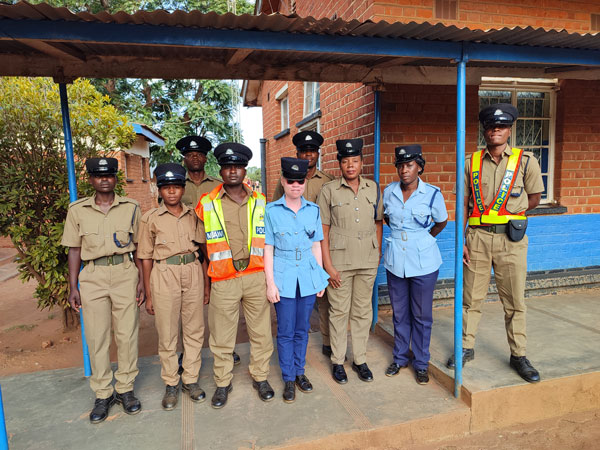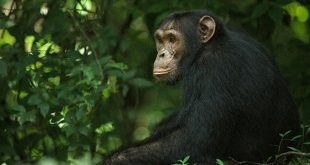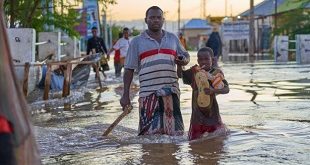
When Brenda Comfort Mhlanga’s face was plastered across the media when she was hired as a police officer in 2022, her appointment was met with accusations of preferential treatment. Just a year on the job and this woman living with albinism dreams of one day becoming the Inspector of Police.
SPECIAL REPORT | BIRD AGENCY | For many Malawians, the very idea that a person living with albinism, which has made many into targets for body parts traders, could be recruited to protect ordinary Malawians, was almost ludicrous.
That was until the Malawi Police Service (MPS) recruited two people with albinism into its services.
“I do not believe this. You see, we are appealing to police to protect our brothers and sisters with albinism from some misguided people who believe there is richness in their body parts. Now to suggest that the very people that need protection are protecting us is unimaginable.” said Dalington Gondwe, who lives less than a kilometre from a police training school in Limbe, Blantyre, in southern Malawi.
But for Brenda Comfort Mhlanga, aged 21, who recently graduated from the training school, there is nothing to worry about.
Mhlanga was born with the rare genetic pigment disorder and was hired by the police service, together with a male colleague who has the same condition, in August 2022.
“Since I went to police training school, I was doing everything that everyone was supposed to do. I could run and carry out security exercises and I tell you that I can run faster than those with dark skin,” Mhlanga said.
Mhlanga was born into a family of four children in Mzimba district in northern Malawi. While neither parent has albinism, both she and her older brother were born with the condition.
Fulfilling a childhood dream
After completing her primary schooling, Mhlanga was selected to attend a secondary school close to Lake Malawi but the area was too hot, making it unsuitable for her condition so school authorities moved her to Mzimba Secondary School, nearer to her home.
Mhlanga’s ambition was to become either a police officer or a lawyer.
“While at school, I admired police officers. I would ask them about their work and they encouraged me. With the grades I got, I knew that my dreams of becoming a lawyer are gone, so my focus was on the police,” she said.
After completing her secondary education, Mhlanga was patient as she waited for the police service to issue a recruitment advert. This came in 2021 and when she applied, she was called for an interview.
Her interview was successful and was followed by full police training. Mhlanga denied allegations that officials may have been lenient because of her condition.
“There are three types of interviews at the police — physical, written and oral. I passed all of them. In fact, it was at the police training school that I realised that it was just a skin different from others, otherwise, we all did the same things,” she disclosed.
Getting on with work
After completing her police training in August 2022, Mhlanga was posted to Kasungu Police Station, about 440 kilometres away from Blantyre.
Kasungu Police Station Officer-in-Charge, Senior Assistant Commissioner of Police Francis Titani Chisoti described the young woman as a hard worker, dedicated to her job.
“She is just doing fine. There is nothing like special treatment when it comes to assignments. We share work here and she is doing what has been assigned to her which she does well,” he said.
National police spokesperson Peter Kalaya disclosed that Mhlanga and her colleague, Hamid Vasco, were equally qualified.
“From their academic qualifications to their physical abilities, the two satisfied our recruitment team that they could make it in MPS. They underwent the same scrutiny during interviews like any other person. Again, they underwent the same training like any other during their nine months of basic police training course…” Kalaya said.
Kalaya added that with cases of attacks and killings of people with albinism being registered each year, the recruitment of the two new officers was a chance for the police to send a serious message to perpetrators of attacks on people with albanism that they also have officers with the condition.
The Association of Persons with Albinism in Malawi (APAM) said the recruitment of people with albinism into the police service fulfilled what the organisation has been fighting for.
“We looked at it as a breakthrough because communities will say ‘if people with albinism can be police officers, then they are as normal as everyone’. Police training is hard and for them to finish, it shows how strong they can be,” said APAM national coordinator, Maynard Zachariah,
Zachariah said the organisation had been pushing for the police service to hire people living with albinism.
“We wanted visibility. Police officers in uniform can easily be noticed. Hamid Vasco is a police traffic officer, seen stopping and checking vehicles on the road… We also wanted to change some people’s perceptions who believe that people with albinism cannot do work that requires energy.”
Renowned Malawian human rights activist Michael Kaiyatsa from the Centre for Human Rights and Rehabilitation (CHRR) hailed the recruitment of people with albinism into the police service.
The activist, however, asked the government to address the root cause of the dangers persons with albinism face.
“Why are authorities failing to discover the market of body parts of people with albinism? We fail to understand this by looking at how they are able to dig into other issues. This is creating suspicion among people who suspect that politicians could be involved,” Kaiyatsa said.
Considering the threat people with albinism face in Malawi, and also that she could be a target, Mhlanga sees no threat.
“I don’t even think about it because it will waste my time. I just go about doing my work, including carrying out patrols at night. I believe that if I am attacked, with the police training I got, I can defend myself,” she said.
Mhlanga said she now dreams of becoming the police Inspector General, the highest-ranked police officer in Malawi.
******
SOURCE; Edwin Nyirongo, bird story agency
 The Independent Uganda: You get the Truth we Pay the Price
The Independent Uganda: You get the Truth we Pay the Price


